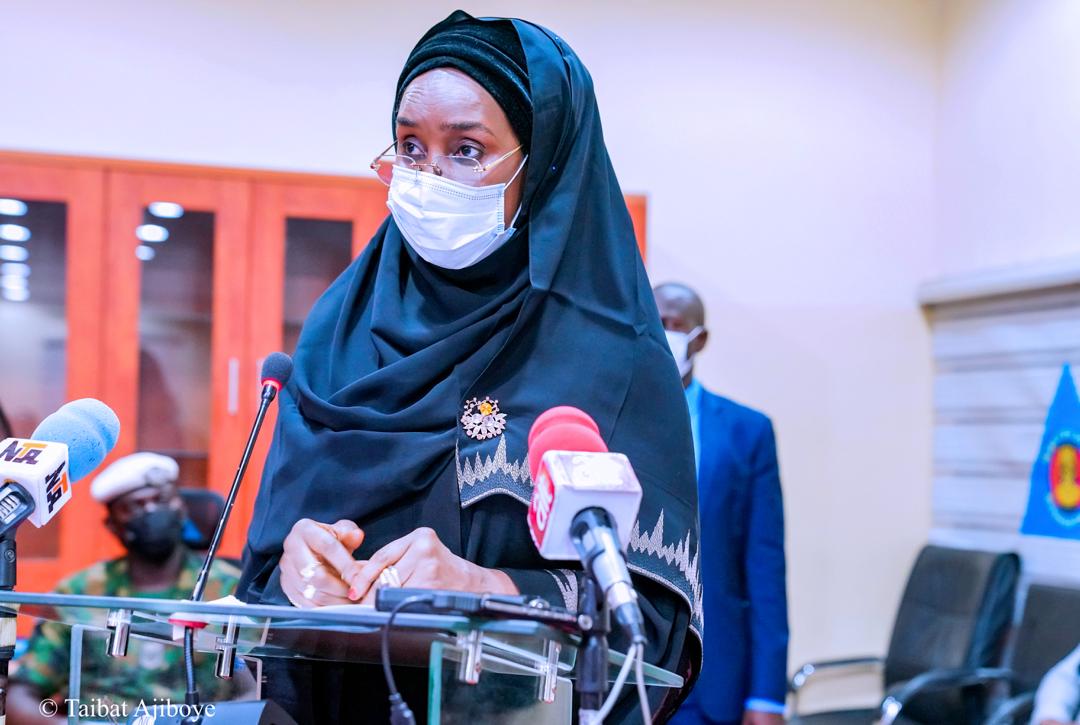By Joyce Remi- Babayeju
In a landmark flag – off event in Abuja , the Ministry of Humanitarian Affairs, Disaster Management and Social Development today in Abuja distributed engagement letters and Tablets to 4452 independent trained independent monitors for the National Social Investment Programme, NSIP.
The Minister Sadiya Umar Faruoq officially flagged off the programme of distribution of letters of engagement and tablets to independent trained monitors and and also launched the Social Investment Management Information System, SIMIS, Application at the Armed Forces Resource Center in Abuja today said that the NSIP is aimed at alleviating 100 million Nigerians out of poverty.
The distribution exercise would be replicated across the country.
Out of the 5000 independent Monitors shortlisted 4452 were trained across the country.
The tablet devices given out are equiped with an Application that would be used to report on monitoring activities of the trained independent monitors.
She said, ‘ the National Social Investment Programme ,NSIP, was created by President Muhammadu Buhari in 2016 with the mandate of lifting citizens out of poverty through a number of Social Interventions which include the Job Creation Programme – N-POWER, National Home-Grown School Feeding Programme (NHGSFP), Conditional Cash Transfer Programme (CCT), and the Government Enterprise and Empowerment Programme (GEEP).”
The tablet devices given out are equipped with an Application that will be used to report on monitoring activities of the trained Independent Monitor.
” The Application which we called the Social Investment Management Information System (SIMIS), is a mobile and web-based Application designed for Monitoring the National Social Investment Programme.”
“Using this Application, the Ministry sees real time report of activities of the Independent Monitors on the Field. We can view reports submitted and see the NSIP performance indicators by state and detect areas of challenges.
“For example, under the National Home-Grown School Feeding Programme, we can see where feeding has taken place and where there is no feeding happening. This will provide greater visibility to the Ministry and equip us with information to follow up with implementation happening at the state level.”
According to the minister the Application allows the Ministry to have visibility up to the local government level. It will guide us at the Federal Level to ensure that, the programmes are working in line with their objectives, and also task the states to ensure they meet up with their deliverables towards effective implementation of the Programme. Essentially, it will help us deliver on our mandate and contribute to Mr. President’s vision of lifting 100 million Nigerians out of Poverty.
The Independent Monitors are expected to monitor a designated number of beneficiaries of the National Social Investment Programme, she emphasized, adding that each monitor would bep paid a monthly stipend of N30,000, and they must meet up to 80% of their deliverables monthly to be eligible for their stipend.
Their duties includes routine Monitoring of all programmes under the National Social Investment Programme (NSIP) in their assigned LGA, provisionof evidence-based report on findings in the field, submission of various categories of reports in accordance with the set timelines and attending all trainings and meetings as required by the ministry.
The terms of engagement is for a duration of one year from the 1st June 2021 to the 31st May 2022 .
Permanent Secretary of the ministry
Alhaji Basir Nura Alkali noted that the NSIP is a National Programme designed to promote sectoral linkages and synergies and ensure partnerships with critical stakeholders, as well as the buy-in and ownership of States and Local Governments.
Alkali said that the engagement of independent monitors is a proactive strategy to monitor the programmes under thehe NSIP to achieve the desired results.
He we explained that the NSIP has four components, namely the National Home-Grown School Feeding Programme (NHGSFP), the Government Enterprise and Empowerment Programme (GEEP), Job Creation Programme (N-Power), and the Conditional Cash Transfer Programme (CCT).
The duties of Independent Monitors, he said is to monitor programme beneficiaries within their locality in schools, households, and market clusters on a routine basis using a standardized reporting tool which we have made available in hard copy as well as electronically. This would help measure the impact of these programmes.
He expressed optimism that the programme will help improve lives by ensuring a more equitable distribution of resources to the vulnerable populous, including children, vulnerable youths, and women.

Leave a Reply